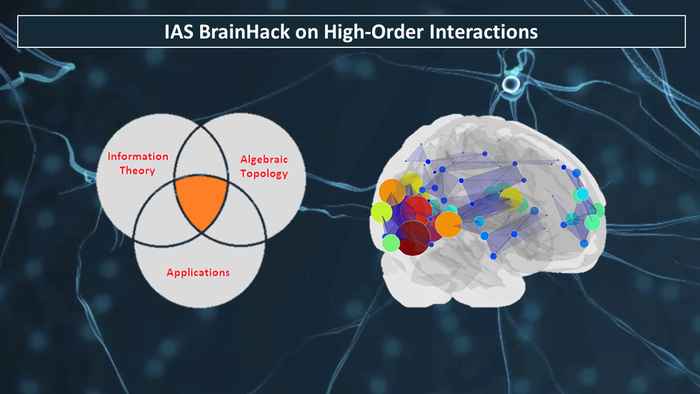High-order interactions in the Human Connectome (on-site)
IAS BrainHack
- Start date
- 19 October 2022
- End date
- 21 October 2022

Background
High-order interactions (i.e., interactions involving more than two regions) are at the forefront of recent developments in complexity science. Studying high-order interaction in the human brain may contribute to new fundamental knowledge about the neural mechanisms underlying ageing-related cognitive changes and the impact of neurodegeneration on brain functioning through the lens of network neuroscience. More fundamentally, applying high-order analyses can contribute to understanding complex systems and their complexity.
In this IAS BrainHack you get the opportunity to learn about high-order interactions, apply them to brain networks, and contribute to this research yourself!
IAS fellow Fernando Santos, IAS member Rick Quax and collaborators intend to investigate the human brain using state-of-the-art theoretical methodologies in complex systems, to quantify high-order interactions in the human brain and their relationship with behaviour.
The applied part of research in high-order interactions is built upon analyzing large-scale human brain imaging databases. Doing fundamental research using these databases requires expertise in neuroimaging, which is often lacking among scholars in natural sciences. To overcome this interdisciplinary knowledge gap, IAS sponsored the work of Floris Tijhuis on the Human Connectome (HCP) database. With the support of MULTINET team members at VUmc, the database is available at zenodo. Access to this database enables scholars keen to work on large-scale brain databases but who do not have access to the resources to acquire the data themselves. The possibilities with such datasets are endless, so they require a team effort.
Brain Hackathon
For this reason, IAS will host Fernando Santos, Tommy Broeders (from VUmc) and Rick Quax, Jie Li, and Cillian Hourican (UvA) for a Brain Hackathon from 19-21 October 2022. They dedicate a three-day high-order hackathon to teach you to code using a combination of courses, group assignments, and applications to the human connectome database. Computer science peers often organize Hackathons but have recently been adopted within neuroscience (see Brainhack Global). This IAS BrainHack is specifically designed to stimulate cooperation between neuroscientists and students in natural sciences. The focus will be on learning and investigating high-order interactions in resting-state functional MRI data and will consist of a combination of group assignments. One group will be crowned the winner at the end of the event. The winning group will have the opportunity to present their work in a workshop on high-order interactions and develop research in high-order interactions at IAS after the Brain hack. IAS will also sponsor food during the hackathon, as well as drinks at the end of the event.
Registration
Limited spots are available, and you must register by writing to f.a.nobregasantos@uva.nl until 13th of October. Be mindful, however, that all three days will be packed, and total attendance is needed for the group assignments, so be sure to cancel other meetings. Finally, some prior experience with coding in python is required, but you are not expected to be a coding expert.